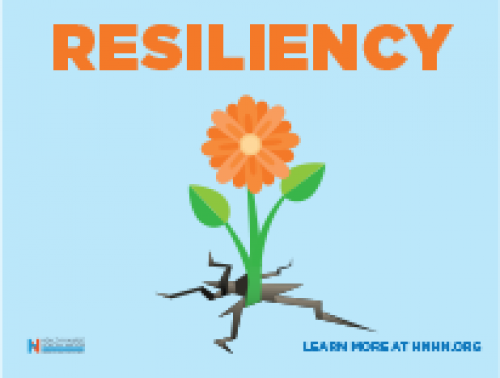Grow Your Resiliency Challenge Tips
Published

Below are the Grow Your Resiliency challenge daily tips. Use the social share links on this page to share them with a nurse you know!
Day 1: Understand Moral Distress, Resilience, and Courage
Moral resilience and moral courage are concepts designed to decrease or manage moral distress. Many health care workers may experience moral distress without being able to name it. Here’s a refresher on what these terms mean, so you can clearly recognize these experiences:
- Moral distress is when organizational policies or procedures prevent a nurse from doing what he or she thinks is right. This dilemma, dubbed “moral distress,” can make nurses feel powerless, anxious, and even depressed.
- Moral courage is developing the strength to speak up about your hesitations despite the fear of repercussions.
- Moral resilience is the internal capacity nurses have to restore and sustain their personal integrity in response to moral distress.
Our blog posts, Moral Distress: What It Is and What to Do About It and Learn How to Cultivate Moral Courage dive more deeply into these topics, including examples from real nurses. Have you had any instances of moral distress on the job? Tell us in our discussion or on Facebook.
Day 2: Know Your Code Of Ethics
When a situation doesn’t feel right to you, you may feel nervous about speaking up. Knowing your profession’s code of ethics can empower you and prevent you from second-guessing yourself. Take some time today to review the Code of Ethics for Nurses. Consider setting a reminder in your calendar to go through it every few months, so it’s fresh in your mind.
It's day 5 of the Grow Your Resiliency challenge!
The most resilient nurses use the resources available to them through their community or employer, including:
- Counseling services
- Debriefing sessions
- Educational opportunities
- Peer-to-peer support
- Employee assistance programs (EAPs)
- Ethics committees
Day 3: Practice Mindfulness
Research suggests mindfulness can help you become more resilient. Not only does taking time to be present help you to become a more resilient nurse, but it can also help you to be calmer, less stressed, and more content.
Here are some ways to help be more present every day:
- Stop and breathe deeply every so often.
- Use apps like, Stop, Breathe, & Think, Calm and Headspace for short guided meditations.
- Read our blog posts, The Beginner’s Guide to Meditation, Meditation 101: Know Your Options and Channeling Mindfulness in Nursing, to help you begin a mindfulness practice.
- Try nurse-focused meditation programs like these from our Friends of HNHN organizations, Transcendental Meditation for Nurses and Wellness at your Fingertips.
Do you make time for meditation or quiet in your life? Post a picture of your meditation spot or any books or tools you like to use on Instagram. Tag #healthynurse so we can get tips from one another or share in our discussion or on Facebook.
Day 4: Be Kind To Yourself
Caring for yourself is not a selfish act, but rather a critical piece of caring for patients. In fact, Provision 5 of the Code of Ethics for Nurses with Interpretive Statements requires “nurses hold the same duties to self as to others.” Think of ways you can make time for renewal in your own life, like going to bed an hour earlier, making time to exercise, or regularly scheduling time to meet up with friends.
Find more ideas in our Self-Care for the Caregiver blog post. Tell us how you make time to treat yourself in our discussion or in our Facebook group.
Day 5: Use What You Have
The most resilient nurses use the resources available to them through their community or employer, including:
- Counseling services
- Debriefing sessions
- Educational opportunities
- Peer-to-peer support
- Employee assistance programs (EAPs)
- Ethics committees
Day 6: Be a leader to others in nurse resiliency.
Nurses have the power to support and enrich moral resiliency in the workplace. Here are some ways nurse leaders can foster resiliency:
- Share resources to help nurses overcome moral distress and build moral resilience, including our Call to Action Report, Exploring Moral Resilience Toward a Culture of Ethical Practice or these challenge emails.
- Participate in organization-wide ethics committees to bring the nursing perspective into decision-making.
- Make an effort to become skilled at recognizing and taking ethically grounded action in response to disagreement or conflict.
- Find and/or ask your employer for support programs for nurses, such as self-care training, ethical competence classes, and continuing education, among others, including ANA’s Professional Issues Panel’s Call to Action Report, Exploring Moral Resilience Toward a Culture of Ethical Practice.
Day 7: Make an effort to support moral resilience within your organization
Even if every nurse prioritizes cultivating moral resiliency, there will not be a huge shift in overcoming moral distress unless hospitals and employers support nurses, too.
Here are some extra tips for nurse administrators to develop moral resiliency among nurses:
- Provide ongoing assessments on moral distress, courage, and resiliency and use the data to meet nurses’ needs.
- Collaborate with ethics organizations and host seminars on key topics.
- Support new nurses as they enter the workforce so they can develop lifelong skills to cope with moral distress.
- Find more recommendations in ANA’s Professional Issues Panel’s Call to Action Report, Exploring Moral Resilience Toward a Culture of Ethical Practice.
Congratulations on completing this challenge. We hope you’ll continue to share resources on moral resiliency with fellow nurses, support each other in overcoming moral distress, and to be an advocate for building resiliency in the workplace.
Use the social share links on this page to share the Grow Your Resiliency challenge tips with a nurse you know.

Blog Challenge Tips
04/15/2019 9:33am CDT



Post a Comment or Question